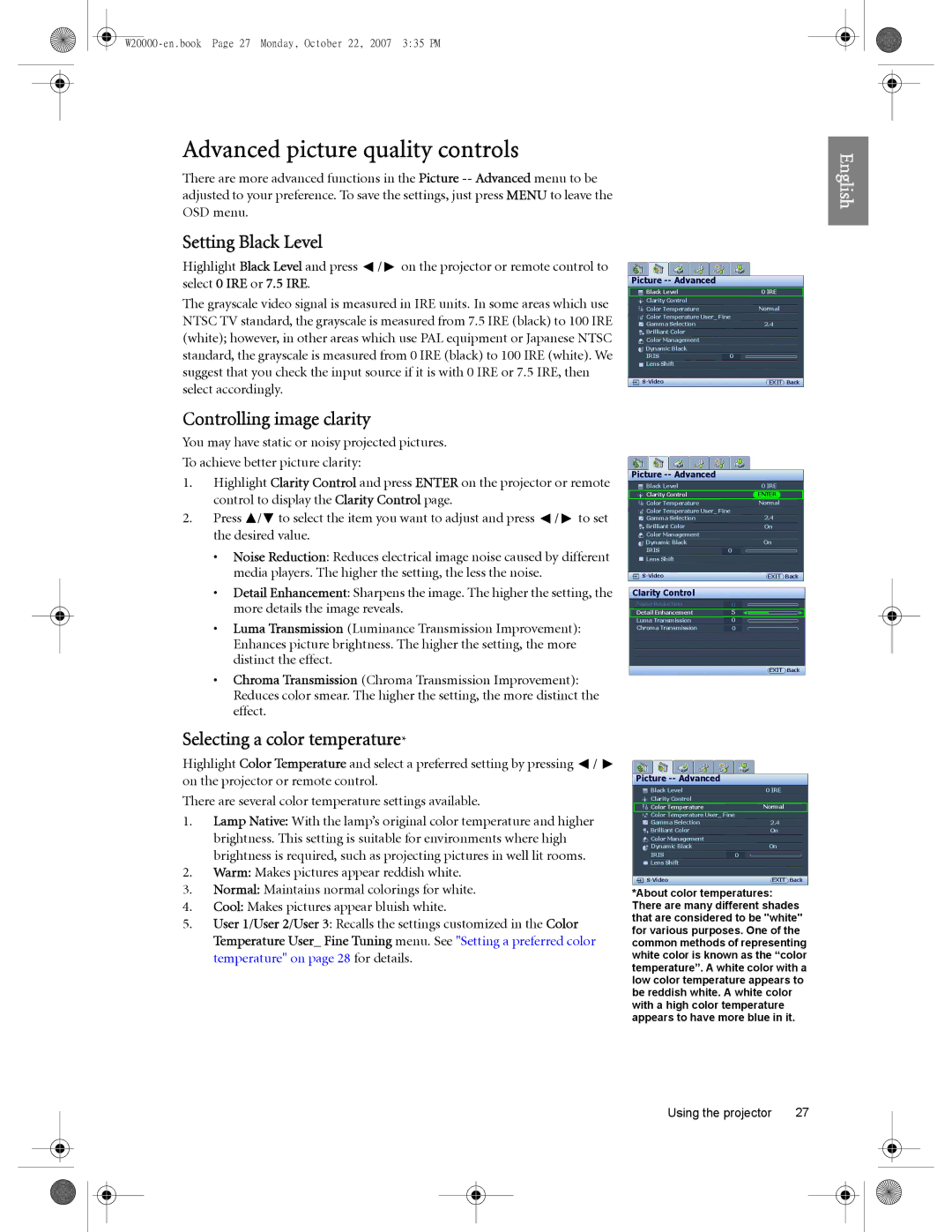
Advanced picture quality controls
There are more advanced functions in the Picture
Setting Black Level
Highlight Black Level and press ![]() /
/ ![]() on the projector or remote control to select 0 IRE or 7.5 IRE.
on the projector or remote control to select 0 IRE or 7.5 IRE.
The grayscale video signal is measured in IRE units. In some areas which use NTSC TV standard, the grayscale is measured from 7.5 IRE (black) to 100 IRE (white); however, in other areas which use PAL equipment or Japanese NTSC standard, the grayscale is measured from 0 IRE (black) to 100 IRE (white). We suggest that you check the input source if it is with 0 IRE or 7.5 IRE, then select accordingly.
Picture -- Advanced
Black Level | 0 IRE |
Clarity Control |
|
Color Temperature | Normal |
Color Temperature User_ Fine | |
Gamma Selection | 2.4 |
Brilliant Color |
|
Color Management |
|
Dynamic Black |
|
IRIS | 0 |
Lens Shift |
|
EXIT Back | |
English
Controlling image clarity
You may have static or noisy projected pictures.
To achieve better picture clarity:
1.Highlight Clarity Control and press ENTER on the projector or remote control to display the Clarity Control page.
2.Press ![]() /
/![]() to select the item you want to adjust and press
to select the item you want to adjust and press ![]() /
/ ![]() to set the desired value.
to set the desired value.
•Noise Reduction: Reduces electrical image noise caused by different media players. The higher the setting, the less the noise.
•Detail Enhancement: Sharpens the image. The higher the setting, the more details the image reveals.
•Luma Transmission (Luminance Transmission Improvement): Enhances picture brightness. The higher the setting, the more distinct the effect.
•Chroma Transmission (Chroma Transmission Improvement): Reduces color smear. The higher the setting, the more distinct the effect.
Selecting a color temperature*
Highlight Color Temperature and select a preferred setting by pressing ![]() /
/ ![]() on the projector or remote control.
on the projector or remote control.
There are several color temperature settings available.
1.Lamp Native: With the lamp’s original color temperature and higher brightness. This setting is suitable for environments where high brightness is required, such as projecting pictures in well lit rooms.
2.Warm: Makes pictures appear reddish white.
3.Normal: Maintains normal colorings for white.
4.Cool: Makes pictures appear bluish white.
5.User 1/User 2/User 3: Recalls the settings customized in the Color Temperature User_ Fine Tuning menu. See "Setting a preferred color temperature" on page 28 for details.
Picture -- Advanced
Black Level |
| 0 IRE |
| |
Clarity Control |
| ENTER |
| |
Color Temperature |
| Normal |
| |
Color Temperature User_ Fine |
| |||
Gamma Selection | 2.4 |
| ||
Brilliant Color |
| On |
| |
Color Management |
|
|
|
|
Dynamic Black |
| On |
| |
IRIS | 0 |
|
|
|
Lens Shift |
|
|
|
|
| EXIT | Back | ||
Clarity Control |
|
|
|
|
Noise Reduction | 0 |
|
|
|
Detail Enhancement | 5 |
|
|
|
Luma Transmission | 0 |
|
|
|
Chroma Transmission | 0 |
|
|
|
|
|
| EXIT | Back |
Picture -- Advanced
Black Level | 0 IRE |
Clarity Control |
|
Color Temperature | Normal |
Color Temperature User_ Fine | |
Gamma Selection | 2.4 |
Brilliant Color | On |
Color Management |
|
Dynamic Black | On |
IRIS | 0 |
Lens Shift |
|
EXIT Back | |
*About color temperatures: There are many different shades that are considered to be "white" for various purposes. One of the common methods of representing white color is known as the “color temperature”. A white color with a low color temperature appears to be reddish white. A white color with a high color temperature appears to have more blue in it.
Using the projector | 27 |
